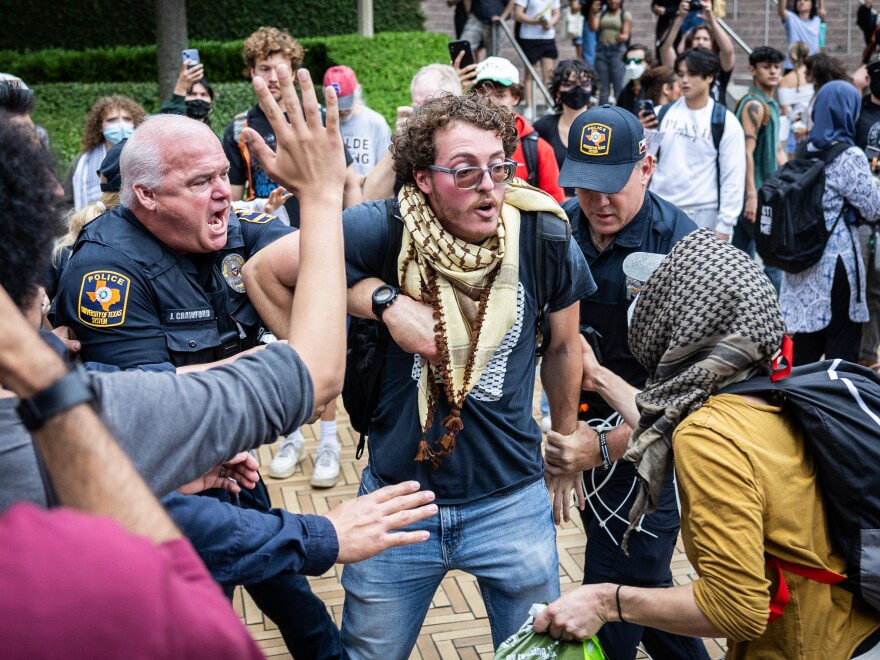By Sergio Martínez-Beltrán
Published May 7, 2024

Michael Minasi/KUTAmmer Qaddumi was arrested at a Pro-Palestinian protest at UT-Austin on April 24, 2024.
AUSTIN– Ammer Qaddumi is jumping up and down at the beat of a drum.
He has a rolled-up piece of paper in one of his hands that he moves to the rhythm of the crowd's chant.
"Disclose, divest, we will not stop, we will not rest," he chants along with hundreds of students at the University of Texas at Austin's south lawn.
Qaddumi is a Palestinian-American studying economics and government, and for the last couple of weeks, he's been participating in the protests against Israel's military actions in Gaza.
Israel has been responding to the Oct. 7 attack by Hamas, which killed over 1,200 and took over 200 people as hostages.
Over 34,000 Palestinians have been killed during the war in Gaza.
"We have a duty to advocate for Palestine, to ensure that people understand the narrative, the Palestinian narrative, the history of the Palestinian struggle," Qaddumi told NPR Sunday.
The demonstrations at UT-Austin have been mostly peaceful, although at times, tensions have increased and students have been arrested, including Qaddumi, who was the first person arrested nearly two weeks ago.
"We will continue to come out and advocate for Palestine no matter what obstacles UT administration, our state government tries to put in our way," Qaddumi said.

Michael Minasi/KUTAmmer Qaddumi
Qaddumi's charges were later dropped. Most students arrested were charged with criminal trespass.
Brian Davis, a spokesperson for UT-Austin, told NPR in an email that students violated several institutional rules, which include attempting to establish an encampment, unauthorized use of amplified sound, and shoving staff. However, no student has been charged with assault.
It's unclear if these students would be put on probation, suspended or expelled.
Davis said no disciplinary action has been distributed, but that it could happen once final exams are done this week.
Sam Law, a Jewish American graduate student, was arrested after participated in a pro-Palestinian protest at UT-Austin. He was charged with criminal trespass and now is concerned about potential punishment.
"As a person of conscience, I cannot let threats like that deter me," Law told NPR from his Austin home. "I really am worried and I've had a lot of conversations with the chair of my department, with lawyers about what might happen if the university pursues disciplinary action."
According to the Associated Press, there have been over2,000 arrests on college campuses in relation to pro-Palestinian protests and encampments.
The disciplinary actions taken by the universities are unknown — some of them have cited federal education privacy laws to not provide numbers on how many students are subject to disciplinary action.
But some students have been sharing their stories.

Jacob Mack / USA Today Network/Reuters
/
USA Today Network/ReutersCornell University divestment protestors set up this encampment on the University's Arts Quad.
Cornell University doctoral student Momodou Taal was suspended for participating in a pro-Palestinian encampment.
"The school has deemed that my activity or my participation on campus is a threat somehow," Taal said.
Taal was never arrested, but his involvement with a pro-Palestinian team negotiating with Cornell University administrators got him suspended, he said.
He is now in a fairly unique position.Taal is a British student, and a suspension could lead to him losing his international student visa.
"Fundamentally, I risked all that I've risked so far for what I believe is a just cause, and that's the Palestinian cause," Taal said.
In a written response to NPR, Cornell University said students have been offered an opportunity to get their suspensions lifted.
"The university determined that if a student could commit to abide by the terms of the temporary suspension and not facilitate, engage in, participate or assist in any other violations of university policy, it would be appropriate to modify the temporary suspension to allow for incompletes to be entered for the spring 2024 term," Joel M. Malina, Cornell's vice president for university relations said.
"This would provide an opportunity to complete course work and earn credit for the term at a later date when the student is able to resume academic activities."
Taal is considering his options. He said he was guided by his conscience, and that participating in the protests was the right thing to do.
Anna Ivey, a former dean of admissions at the University of Chicago Law School, said suspensions and expulsions could pose serious consequences since they remain in the students' academic records.
"You probably will have to disclose it somewhere when you try to find other alternatives and move on with your life," Ivey, who owns a company that advises students on their college application, said.
But the disciplinary actions are not necessarily career-ending for students.
"I think a lot of admissions officers are watching in horror at how students are being treated," Ivey said. "So, I don't think they should assume that they are necessarily going to encounter hostility or that people aren't even going to look at the circumstances."
Someone who is thinking about what to do next is Nick Wilson, a suspended undergraduate student at Cornell University.
He was one of the students arrested in March for occupying an administrative building.
He said it was scary to learn about the disciplinary actions Cornell was taking against him.
"What's happening in Gaza is so striking, such a moral atrocity," Wilson said from his on-campus housing room. "For me and for students like me — students who are facing police violence, students who are facing arrests, students who are facing suspension — this is a cause that just matters more."
Wilson and the other students said they'd do it again, as long as their universities refuse to divest from businesses with ties to Israel.
Copyright 2024 NPR
No comments:
Post a Comment